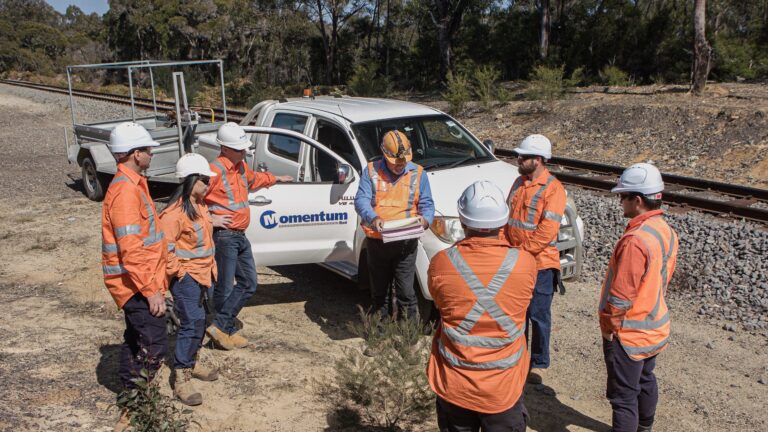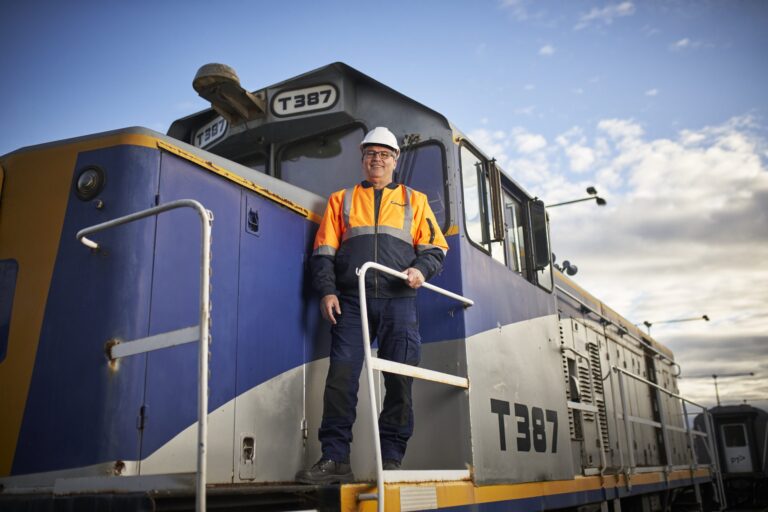10 Reasons Your Manager Should Pay for Your Upskill Training in Rail
As a rail industry worker, upskill training is essential to keep up with the constantly evolving landscape of the rail sector. However, this can be costly and time-consuming, making it challenging for you to gain skills and knowledge required to excel in your roles. This makes managers crucial in helping you as an employee stay ahead of the curve and drive success for the company by supporting and investing in your upskilling and development.
Australia’s rail sector is among the top contributors to the national economy and employs over 142,000 people directly and indirectly. With ever-changing technology and the government’s initiatives to develop rail infrastructure across the country, there’s a growing demand for skilled professionals in the rail sector.
Whether you’re just starting your career in rail or have already served for a few years, you should be looking to enhance your skill set, take up new challenges, and improve your career prospects.
Can’t spare time from your current job? Lack finances to enrol in nationally recognised rail training? Well, the good news is we’ve created a list to help you ask your manager to pay for your upskill course in the rail industry. In fact, the list outlined below is really for your company’s own good, because upskilling existing employees has big benefits for business, morale and performance.
Here is why your manager should help you upskill and see professional growth.
Benefits of Upskilling Rail Employees
While many companies realise the importance of training their employees, it’s easy for individual training and skills development requests to get lost in the busyness of everyday work. Plus, training can often come down to an individual manager agreeing to training and upskilling their team. Saying ‘yes’ to training can also impact manager budgets, team schedules and staff availability as well as require the redistribution of workloads. That’s why we’ve created this list of key points you can use to support your rail training requests. With benefits across the board, your manager will be reminded of the significant positive benefits of continuous learning across so many of their key metrics.
From boosting productivity to reducing costs and getting a competitive edge, here are 10 ways you can position additional rail training as a benefit to the company to earn yourself professional growth opportunities.
1.Better Upholding Industry-Specific Safety Standards
Rail is a high-risk industry and employs strict safety standards. Companies working in the rail sector must strictly follow all safety protocols to avoid disastrous accidents and ensure employee safety. Investing in upskilling is probably the most efficient way to keep employees up-to-date with the latest safety standards.
2.Increasing Productivity and Efficiency
With the rail industry already facing a skills crisis, the best way to increase productivity at work is to upskill employees to perform their roles better. Skill training can make employees more knowledgeable and give them hands-on experience to perform their job more efficiently. It enhances their problem-solving abilities and significantly improves their quality of work.
3.Keeping Up with the Latest Technological Developments
With the rapid advancement of technology, the rail industry is constantly changing. Today’s in-demand skills will become outdated within the next five years. Therefore, it is important to keep employees abreast of modern technology to meet today’s technological challenges, and stay ahead of the curve.
4.Building Morale
Learning new skills and gaining more knowledge can help increase team morale and motivation. Employees feel more confident and become more adaptable. They’re ever-ready to take on new challenges and responsibilities. As a result, their ability to think critically and innovate is enhanced significantly. This change in approach can certainly benefit the company’s goals big time.
5.Reducing Costs with Improved Efficiency
Upskilling existing employees is an investment which pays dividends. Professionally trained, knowledgeable employees are an asset. They help improve efficiency, reduce downtime, and prevent potential disasters.
Furthermore, a new hire costs the employer significantly higher than upskilling an existing employee. So, it’s for their own good to pay for you to upskill in the rail industry.
6.Developing Expertise and Becoming the Industry Leader
The rail industry requires a lot of technical expertise for employees to excel in their roles. If an employer doesn’t invest in upskilling their employees, they won’t produce extraordinary results.
Upskilling is a great way to develop expertise and equip your employees with hands-on skills to enable them to excel in their current roles. It will, in turn, help the company become a leader in its field.
7.Improving Customer Service
A great customer experience paves the way for a company’s success. Managers can ensure better customer service and satisfaction by investing in upskilling their employees. With more experienced and knowledgeable staff, customer handling can be improved and customer satisfaction increased.
8.Enhancing the Company’s Reputation as a Reliable Service Provider
An investment in upskilling employees will help equip them with the most in-demand skills and improve their on-job performance significantly. Improved employee performance automatically translates into better results on every project and can enhance the company’s reputation.
It will help the company become a respected leader in the rail industry and certainly mean more business.
9.Attracting New Talent
When a company builds a reputation as an industry leader who fosters a culture of employee satisfaction and professional growth, it automatically attracts new talent. Potential employees will know the company is dedicated to keeping up with the latest industry trends and offers plenty of opportunities for growth.
As a result, new talent keeps coming in, and the company improves its capabilities across diverse fields and a range of skill sets.
10. Staying Competitive and Achieving Lasting Success
Staying up-to-date with the latest industry trends can help the company stay competitive and ahead of its competitors. As employees continue to upskill, the company builds a more competitive workforce over time which will help achieve sustainable results and lasting success.
Upskill Training with Government Funded Courses
11. BONUS: You probably weren’t expecting this one, but in addition to all the great reasons listed above to entice your manager to enrol you in upskill courses, there is one more great way to potentially secure yourself a training opportunity – government funding schemes.
Did you know that depending on your state, specialist skills training may be offered to eligible workers for FREE(ish)*! State and territory governments offer a range of free or subsidised nationally recognised training and qualifications, full-time, part-time and short courses for eligible students through registered training organisations.
That’s right, some State Governments and the Commonwealth will often partner with a registered training organisation (like CERT Training) to offer specific training needed by the industry at low costs.
Typically, all or part of the training course cost is funded by the State or the Australian government, and workers or employers need to cover the remaining ancillary costs or any additional fees. The government-funded training on offer varies by State, year and industry needs, but CERT Training regularly receives these opportunities nationally. To check your eligibility and find out the Government Subsidised courses covered and available in your state, you can contact us at 1300 042 3780.
The rail industry provides a lot of opportunities for individual growth, and there’s a growing demand for skilled professionals. As the market trends evolve and new technological advancements continue to shape the future of this industry, there will be a growing need for upskilling employees to develop their skill set to meet the new challenges. While upskilling is crucial to the professional growth of individuals, it can help companies gain a competitive edge by cutting costs and developing expertise to become the industry leader.
Upskill Through CERT Training
Upskilling opportunities are now more diverse than ever, offering many learning experiences tailored to fit the different needs of students. Many training providers provide various options, including short courses, online courses, and even learning resources to take at your own pace. At CERT Training, your team members will be taught by certified and experienced trainers and will learn practical skills in workshops equipped with modern tools and machinery.
So, if you are interested and planning a career in the rail industry, or already serving in a role with potential for growth, it’s beneficial to upskill and even better if your manager will pay for it. With all these benefits, they should be more than happy to fork out for your rail training and reap the benefits you’ve outlined to them!
To enquire about our upskill courses, contact us on 1300 042 3780 or click your state below to pick the right training for you:
Enrol in CERT Training now and complete your upskill learning in a professional and trainee-friendly environment.
To stay updated about rail industry practices, key safety information and best practices, follow us on our social media: Facebook and LinkedIn.

ARTC online learning pilot program
With the COVID-19 pandemic shutting down most of what we know to be normal life, the rail industry breathed a sigh of relief when…

CERT and Momentum join forces to create a Workforce Solution
The latest Rail Express article focuses on CERT Training and Momentum Rail Workforce Solutions joining together to provide a holistic Workforce Solution for the…

How to Become a Train Driver in Victoria
Read on for a guide on how to become a train driver in Victoria, from the necessary qualifications and training to different career opportunities that await you on the tracks.
